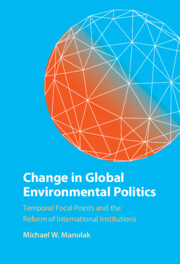 Change in Global Environmental Politics
Change in Global Environmental Politics Book contents
- Change in Global Environmental Politics
- Change in Global Environmental Politics
- Copyright page
- Dedication
- Contents
- Figures and Tables
- Acknowledgments
- Abbreviations
- 1 Introduction
- 2 It’s About Time
- 3 The Stockholm Conference and Institutional Change
- 4 UNEP and the 1982 Nairobi Conference
- 5 The Brundtland Commission and the Seeds of Change
- 6 The Rio Conference and Institutional Change
- 7 Post-UNCED UN Environmental Institutions
- 8 Conclusion
- Bibliography
- Index
3 - The Stockholm Conference and Institutional Change
Published online by Cambridge University Press: 12 May 2022
- Change in Global Environmental Politics
- Change in Global Environmental Politics
- Copyright page
- Dedication
- Contents
- Figures and Tables
- Acknowledgments
- Abbreviations
- 1 Introduction
- 2 It’s About Time
- 3 The Stockholm Conference and Institutional Change
- 4 UNEP and the 1982 Nairobi Conference
- 5 The Brundtland Commission and the Seeds of Change
- 6 The Rio Conference and Institutional Change
- 7 Post-UNCED UN Environmental Institutions
- 8 Conclusion
- Bibliography
- Index
Summary
This chapter provides a detailed analysis of the state of United Nations environmental cooperation between 1963 and 1972, focusing extensively on the 1972 “Stockholm conference.” It shows how a gradual deterioration of the global environment since the Industrial Revolution produced growing incentives to increase the level of international cooperation in global environmental politics. These incentives lay unrealized for more than a decade, however, until momentum gathered in the lead-up to the 1972 United Nations Conference on the Human Environment. The Stockholm conference, which became a landmark event, produced substantial institutional change, including a Declaration, Action Plan, and ultimately the creation of the United Nations Environment Programme (UNEP). The conference, which was originally planned as a largely technical affair, gathered a momentum that was unanticipated by all when it was initially proposed. This momentum is explained by the emergence of a Temporal Focal Point triggered by a series of visible environmental incidents that highlighted long-standing institutional suboptimality. The Stockholm Temporal Focal Point was crystallized by an entrepreneurial conference secretariat led by Maurice Strong.
Keywords
- Type
- Chapter
- Information
- Change in Global Environmental PoliticsTemporal Focal Points and the Reform of International Institutions, pp. 68 - 104Publisher: Cambridge University PressPrint publication year: 2022
